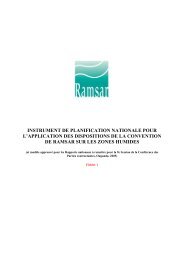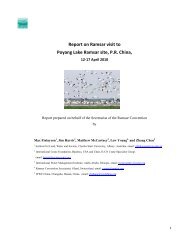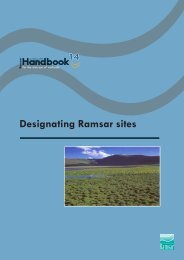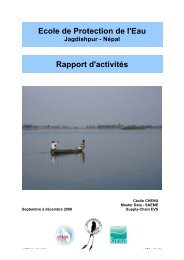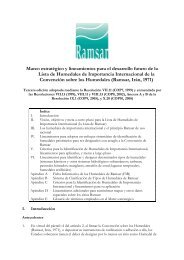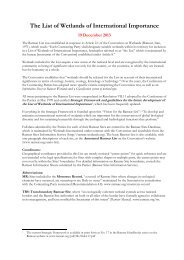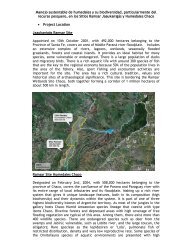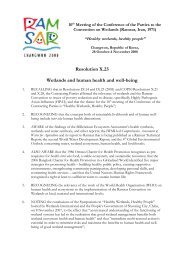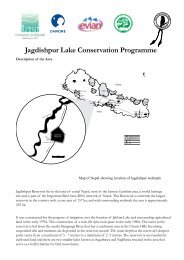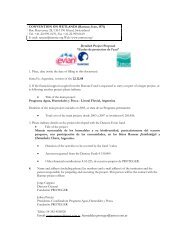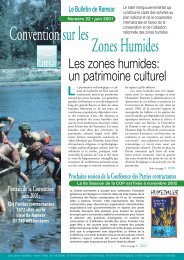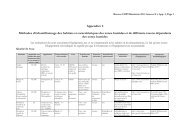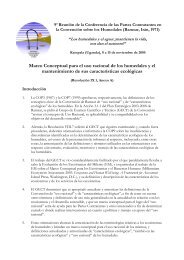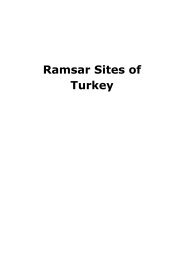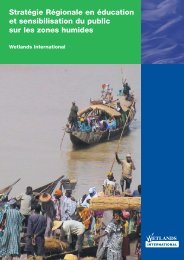Okavango Delta Management Plan - Ramsar Convention on Wetlands
Okavango Delta Management Plan - Ramsar Convention on Wetlands
Okavango Delta Management Plan - Ramsar Convention on Wetlands
Create successful ePaper yourself
Turn your PDF publications into a flip-book with our unique Google optimized e-Paper software.
Theme Key Issues Proposed Pilot Sites<br />
Solid and liquid waste<br />
Manual C<strong>on</strong>trol of Salvinia<br />
molesta<br />
Clearing of small access<br />
channels<br />
Active Use and <str<strong>on</strong>g>Management</str<strong>on</strong>g><br />
of Fire by Resource users<br />
Human/Elephant C<strong>on</strong>flict<br />
99<br />
Solid and liquid waste management systems in tourism facilities and<br />
villages in and around the <str<strong>on</strong>g>Delta</str<strong>on</strong>g> are of c<strong>on</strong>cern. Some tourism<br />
establishments are deep in the <str<strong>on</strong>g>Delta</str<strong>on</strong>g> and the terrain and structure<br />
makes it difficult to access waste collecti<strong>on</strong> facilities. The waste<br />
management costs are therefore high and in some cases discourage<br />
waste management efforts of such establishments. Waste collecti<strong>on</strong><br />
services are not widely provided to all settlements especially the ungazetted<br />
<strong>on</strong>es.<br />
a) A sewage effluent polishing system which utilises locally available<br />
wetland resources will be designed and tested in some tourism<br />
establishments. This system should be ecologically sound, affordable<br />
and easy to implement in tourism facilities.<br />
b) A pilot project surrounding solid waste management in <strong>on</strong>e or more<br />
ungazetted settlements in the eastern panhandle.<br />
People have observed that the biological c<strong>on</strong>trol al<strong>on</strong>e is not effective<br />
and suggested a combinati<strong>on</strong> of physical and biological c<strong>on</strong>trol. Manual<br />
c<strong>on</strong>trol of Salvinia molesta could improve access to wetlands goods<br />
and services thereby increasing income generati<strong>on</strong> opportunities for<br />
local communities to alleviate poverty.<br />
There is a growing c<strong>on</strong>cern from local resource users that access<br />
channels are being blocked. A pilot project to unblock small access<br />
channels to certain areas or resources that communities are dependent<br />
<strong>on</strong> will be developed. This interventi<strong>on</strong> would enhance livelihoods<br />
opportunities in several sectors such as fishing, veld products<br />
harvesting, tourism (poling), etc. This project will bring together<br />
different sectors (water, vegetati<strong>on</strong>, tourism, etc) and therefore<br />
addresses the integrati<strong>on</strong> aspect which is <strong>on</strong>e of the key principles of<br />
the project. This interventi<strong>on</strong> will improve accessibility for the collecti<strong>on</strong><br />
of raw material of craft producti<strong>on</strong> mainly used by women<br />
According to the Herbage Preservati<strong>on</strong> Act, it is illegal and punishable<br />
by law to set the veld <strong>on</strong> fire <strong>on</strong> land that <strong>on</strong>e does not have legal<br />
rights over. However local resource users (communities and tourism<br />
operators) see and use fire as a traditi<strong>on</strong>al management tool and this<br />
leads to unc<strong>on</strong>trolled burning in terms of area affected and timing.<br />
Many different sectors have expressed an interest in the use of fire to<br />
manage resources, e.g. fishermen, photographic and hunting tourism,<br />
reed harvesters, etc. In a pilot project resp<strong>on</strong>sibility could be given to<br />
communities and safari operators to manage fire and m<strong>on</strong>itor its<br />
impact. The multi-sectoral approach will be applied as a resource<br />
management strategy.<br />
The increasing human-elephant interacti<strong>on</strong> is <strong>on</strong>e of the key issues<br />
raised by local communities throughout the c<strong>on</strong>sultative process. Novel<br />
ways to reduce human-elephant c<strong>on</strong>flict are being tried elsewhere<br />
(Caprivi Strip) but such interventi<strong>on</strong>s should be tried specifically in the<br />
Ngamiland c<strong>on</strong>text. Local knowledge should be used to identify various<br />
factors influencing elephant migrati<strong>on</strong> and map migrati<strong>on</strong> routes to<br />
guide land allocati<strong>on</strong> processes and inform alignment of fences and<br />
other regi<strong>on</strong>al planning decisi<strong>on</strong>s in a way that reduces incidents of<br />
human/elephant c<strong>on</strong>flict.<br />
Tourism and CBNRM Tourism and CBNRM was c<strong>on</strong>sidered to be another area which requires<br />
interventi<strong>on</strong> by a pilot project. The current eco-tourism activities within<br />
the <str<strong>on</strong>g>Ramsar</str<strong>on</strong>g> Site are predominantly wildlife based. The communities<br />
have expressed the need to venture into tourism while <strong>on</strong> the other<br />
hand there are c<strong>on</strong>cerns that wildlife tourism might be over subscribed.<br />
It is from the foregoing that Department of Tourism is encouraging the<br />
diversificati<strong>on</strong> of the tourism product into other areas such as cultural<br />
tourism.<br />
<str<strong>on</strong>g>Okavango</str<strong>on</strong>g> Polers Trust –<br />
Ser<strong>on</strong>ga and Thuso<br />
Rehabilitati<strong>on</strong> Centre.<br />
Eastern Panhandle<br />
South Eastern <str<strong>on</strong>g>Delta</str<strong>on</strong>g><br />
Western <str<strong>on</strong>g>Delta</str<strong>on</strong>g> fringes<br />
NG 11 - The Tovera area is<br />
unique in that it is affected<br />
by cross-border fires from<br />
Namibia and the<br />
communities in this area<br />
use it for harvesting<br />
thatching grass<br />
Alternative - C<strong>on</strong>cessi<strong>on</strong><br />
area in the <str<strong>on</strong>g>Delta</str<strong>on</strong>g>.<br />
Eastern Panhandle<br />
1. Tsodilo<br />
2. Eastern Panhandle<br />
The project could <strong>on</strong>ly fund three pilot projects. The less<strong>on</strong>s drawn from these<br />
projects will guide future management opti<strong>on</strong>s. The projects are:<br />
• Tsodilo community cultural tourism,



